Qatar leader plans to attend GCC summit amid boycott

Qatar's Emir Sheikh Tamim bin Hamad al-Thani will attend a crucial summit of the Gulf Cooperation Council (GCC) this coming week, Doha's foreign minister said on Sunday.
Speaking at a forum, Sheikh Mohammed bin Abdulrahman al-Thani said Qatar's leader has accepted the invitation to attend, amid the region's worst political crisis in years.
"I will attend the ministerial council tomorrow and the emir will attend the summit," said the minister.
He added that Qatar has not yet seen the summit agenda, but the current crisis will be discussed at the meeting.
"It is important that the GCC system remains alive," the minister said.
The emir received an invitation from Kuwait at the end of last month to attend the GCC summit.
It was the first such invitation during the ongoing and increasingly bitter Saudi-led diplomatic boycott of Doha.
The summit will start on 5 December, exactly six months since the start of the crisis.
Mohammad al-Hammadi, editor of the UAE Arabic daily Al Etihad noted that the summit may not bring about a solution to the Gulf crisis, but may mark the beginning of the end of the rift with Qatar.
It was unclear who would represent the other members of the GCC at the gathering.
On 5 June, Saudi Arabia, Bahrain, the United Arab Emirates and Egypt abruptly cut all ties with Qatar over accusations Doha supported extremism and was close to Iran. Qatar denies the allegations.
Since the beginning of the crisis, all diplomatic communication between Qatar and the boycotting countries has been stopped.
Founded in 1981, the GCC is a political and economic union that includes Saudi Arabia, Bahrain, the United Arab Emirates and Qatar, as well as Oman and Kuwait.
Kuwait and Oman have not taken part in the boycott of the tiny gas-rich emirate, and Kuwait's Emir Sheikh Sabah al-Ahmad Al-Sabah has acted as a mediator in the crisis.
Middle East Eye propose une couverture et une analyse indépendantes et incomparables du Moyen-Orient, de l’Afrique du Nord et d’autres régions du monde. Pour en savoir plus sur la reprise de ce contenu et les frais qui s’appliquent, veuillez remplir ce formulaire [en anglais]. Pour en savoir plus sur MEE, cliquez ici [en anglais].




